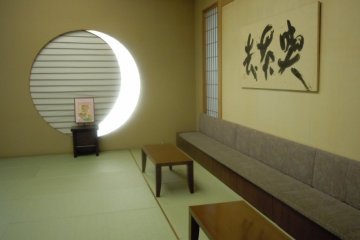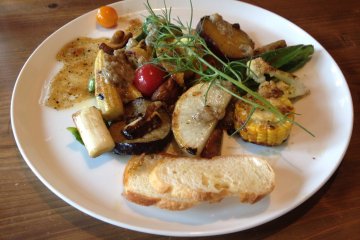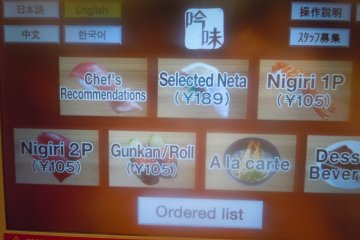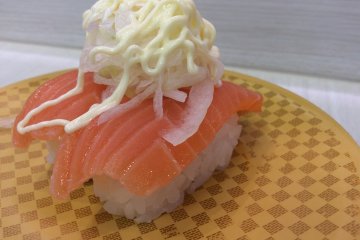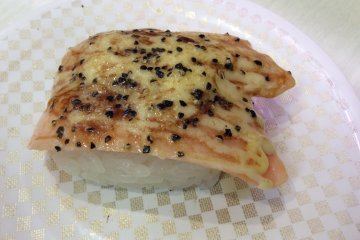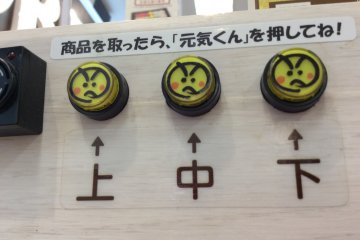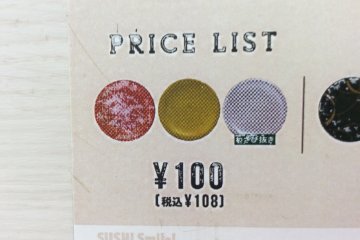Sushi can be affordable, fast and fun. Picture this: a hungry family out late, near the Utsunomiya Interchange and the cedar lined Nikko Kaido (road) and there, at an intersection, the bright lights and large parking lot of the big box sushi restaurant Uobei beacons.
The Chinese character in the name Uobei means fish. Even if you don`t like raw fish, or any kind of fish at all, you can find a snack on the menu at Uobei that will please – be it spaghetti carbonara (¥350 plus tax), tempura, fries or a ¥500 dessert set which includes a free round of roulette on the tablet.
The yellow face logo of Genki Sushi, Uobei's parent company, glows from the buttons and looks down from the wall. Genki Sushi is getting a name for itself as it expands overseas. In Japan, however, there only about 50 Genki Sushi outlets compared to 80 Uobei. What's the difference? Uobei showcases leading-edge technology in large suburban shops, whereas Genki Sushi still employs the conveyor belt service system in urban, smaller-scale shops. Prices are comparable; about ¥100/US$1 a plate.
We walked into Uobei, at about 8:30 PM on a Sunday, in a grumpy mood. The staff cheerfully greeted us and showed us to our table right away. The shop was big and bright. At our table, I reached across to change the tablet to English mode and browse the menu selection. Next, my husband put me to shame as he then easily lifted the tablet from its holder and passed it to me. How convenient! The menu includes information on calories for each dish, and a list of possible allergens in the dishes, albeit those lists are in Japanese only. You can check the running total of your bill at anytime or set up a split bill.
Before ordering, I recommend making a cup of green tea. Green tea helps digest the fatty tempura, fried foods, mayonnaise-laden sushi and fish. Use a smidgen of green tea powder from the box at your table, then fill your cup with hot water from the tap which is also at the table. My son takes his green tea tepid, so we fill his cup half full of green tea then add cold water from a different tap, at the end of the row of booths. If you need a booster seat for your child, you can pick one up when you are getting the cold water; at the Kamitomatsuri branch, the booster seats are stacked against the wall near the washroom entrance.
Next, distribute the chopsticks. Find them hidden alongside the toothpicks and wasabi in a wee drawer in the box on the table. While you are dealing with chopsticks, note that the labels on the bottles by the chopsticks at Uobei include the names of the sauces in English, under their Japanese names.
We each ordered a dish to start. A couple of minutes later, a toy-sized racing car loaded with our order arrived at our table on tracks, a chime sounded, and a yellow button near the tracks lit up. We took our dishes and pushed the glowing yellow to return the car to the kitchen.
My favorite orders of the evening was the seared salmon with black pepper and seared albacore tuna with black pepper, both also available with no pepper, and one piece of broiled fuwatoro conger eel (¥183 incl. tax). The menu describes the eel as “fluffy and melty" which was the only odd English I noticed.
Takeout is also available. My husband took a coffee to go and my son took a drinkable jelly dessert in a foil bag to nurse on the way home. Our bill for the evening came to less than ¥3000, we were all satisfied and had forgotten our grumpiness by the time we stepped outside again.



